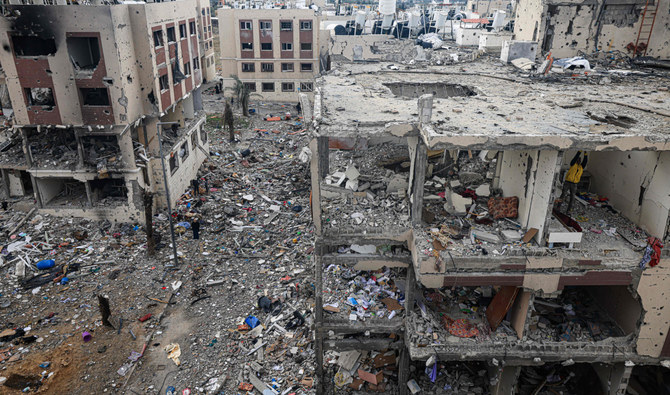GAZA STRIP/RAMALLAH: Swerving to avoid a crater left in the road by a strike, a donkey trots along the debris-strewn streets of Khan Younis in the Gaza Strip, then slows to navigate a narrow passageway cleared through the rubble of destroyed apartment blocks.
With a dearth of fuel caused by Israel’s blockade of Gaza since the start of its war against Hamas, donkey carts have become an essential mode of transport for people and goods in the bombarded Palestinian territory.
A reporter crew traveled with Mohammed Al-Najar, whose home in Khan Younis was destroyed by an airstrike and who is now living with his family in a school in Khuza’a, about 8 km away on the eastern outskirts of town.
“It’s hard to move so we use donkey carts. Unfortunately it takes us three to four hours to reach Khan Younis,” said Najar, speaking on the back of the cart.
The slower pace gives a clear view of a city scarred by war, with the white donkey trotting past one scene of destruction after another.
Some buildings had been destroyed, reduced to grey piles of broken concrete and metal rods, the only traces of color from bits of clothing and possessions strewn amid the chaos.
Others were damaged to different degrees — a pockmarked facade, a hole in a wall, missing windows. One was an empty shell, standing thanks to supporting pillars but with no walls.
Sheets of corrugated iron lay on the ground, bent at strange angles, and piles of rubbish and debris were everywhere.
There were hardly any motor vehicles on the road, just the odd scooter. Bicycles were more common, as well as other donkey carts. Mostly, people were on foot. Two men carried a cooking gas cylinder, sharing the weight between them.
At several locations, buildings on both sides of the road had been flattened, and people had cleared passageways just wide enough for one car to pass. The cart passed the burnt-out carcass of a car marooned in chunks of concrete.
The destruction in Khan Younis in the south is not as extreme as in Gaza City and other parts of northern Gaza that have borne the brunt of Israel’s military campaign. Drone footage from the north shows large areas have been blasted into moonscapes.
Meanwhile, an eight-year-old boy and a teenager were killed by the Israeli army on Wednesday in the occupied West Bank city of Jenin, according to the Palestinian Health Ministry. The ministry said in a statement that “Adam Al-Ghul, eight years old, and Bassem Abu El-Wafa, 15 years old, were killed by bullets from the occupier.”
CCTV footage circulating online and on television news shows a boy being struck by a bullet and falling in the street, sending other children fleeing.
Other images show a teenager also being hit by a bullet and falling, then appearing to call for help as more shots hit the ground around him and other people run for cover.
The teenager can be seen struggling on the ground in apparent agony for at least half a minute.
In other news, Turkish President Recep Tayyip Erdogan branded Israeli Prime Minister Benjamin Netanyahu “the butcher of Gaza” and accused him of spawning anti-Semitism across the world.
“Netanyahu has already written his name in history as the butcher of Gaza,” Erdogan said in nationally televised remarks.
“Netanyahu is endangering the security of all Jews in the world by supporting anti-Semitism with the murders he committed in Gaza.”
Erdogan said: “Statements made by the Netanyahu administration diminish our hopes for the humanitarian pause to be transformed into a lasting ceasefire.”
Separately, Oslo’s city hall on Wednesday raised the Palestinian flag in a show of solidarity with the people of Gaza.
The initiative coincides with the International Day of Solidarity with the Palestinian People, celebrated since 1978 following the adoption of a resolution by the UN General Assembly.
“When we know that more than 5,000 children have lost their lives, equivalent to more than 275 school classes, it is only natural to remember them today” Oslo Mayor Anne Lindboe said on the sidelines of the event, which brought together pro-Palestinian activists.

























